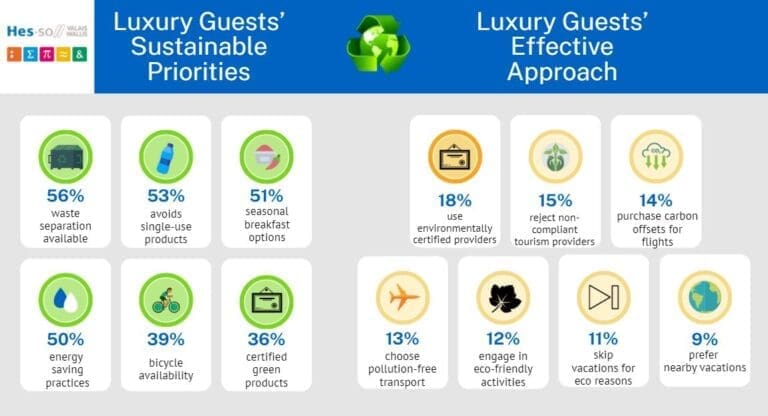 A new study by HES-SO Valais-Wallis in collaboration with HEG Fribourg provides essential insights into the evolving preferences of luxury hotel guests, particularly regarding sustainability. The primary goal of this research is to aid luxury hotels in aligning their digital marketing strategies with the growing emphasis on sustainability among their clientele.
A new study by HES-SO Valais-Wallis in collaboration with HEG Fribourg provides essential insights into the evolving preferences of luxury hotel guests, particularly regarding sustainability. The primary goal of this research is to aid luxury hotels in aligning their digital marketing strategies with the growing emphasis on sustainability among their clientele.
Our findings provide a comprehensive profile of Swiss luxury hotel guests, offering valuable guidance for developing targeted marketing strategies that resonate with environmentally conscious travellers and give crucial insights into the paradox of combining luxury with environmental responsibility, aiming to redefine the perception that these two concepts are mutually exclusive. The complete study can be downloaded below.
Survey overview and methodology
The survey, conducted in November 2023, targeted Swiss residents who had stayed at least one night in a 5-star hotel in 2022 or 2023, yielding 508 valid responses. The comprehensive questionnaire covered hotel preferences, perceptions, values, ethical considerations, financial aspects, and booking habits. Hierarchical cluster analysis was used to identify guest segments.
 Key findings on the perceived benefits of a stay in a luxury hotel
Key findings on the perceived benefits of a stay in a luxury hotel
Service excellence and utilitarian benefits
Guests from Switzerland who stay at 5-star hotels overwhelmingly confirm the high quality of service and superior amenities offered. While there is a strong consensus on attentiveness and service excellence, trust in these hotels as industry experts is moderately high, but not universal. Personalisation of service is valued, although a small segment of guests is sceptical about the link between luxury and higher quality. To address these findings, luxury hotels should focus on consistently exceeding guest expectations, establishing a reputation for expertise through tailored services, using data analytics for hyper-personalisation, and maintaining a robust feedback loop to ensure quality.
Prestige and symbolic value
The symbolic benefits associated with staying in 5-star hotels, such as social status and personal achievement, receive moderate support from guests. However, the enhancement of the overall travel experience through luxury stays receives the least support. This suggests that while symbolic benefits are recognised, they are secondary to utilitarian aspects. Luxury hotels should enhance the guest experience, promote inclusivity, emphasise personalised services and adopt subtle status marketing strategies that focus on the experience rather than overt displays of luxury.
Hedonistic benefits and aesthetics
Most guests find pleasure and self-indulgence in staying at 5-star hotels, seeing it as a form of self-pampering. Aesthetics play a significant role in the decision-making process, although other factors are also influential. Hotels should focus on enhancing the sensory experience through superior design and ambience, market the concept of self-indulgence, maintain an impressive aesthetic and offer holistic experiences that satisfy all the senses, from room comfort to dining and spa services.
Relational benefits and lifestyle alignment
Special occasions are a popular reason for choosing 5-star hotels, with many guests considering these stays an integral part of their lifestyle. Knowledge of a hotel’s values and history is moderately important, and opinions are divided on sharing experiences on social media. Hotels should market themselves as prime destinations for celebrations, invest in storytelling about their brand heritage, develop lifestyle-based loyalty programmes, and balance social media sharing opportunities with privacy options.
Financial advantages and cost-value balance
Perceptions of the financial benefits associated with 5-star hotels are divided. While many guests see value for money and believe the financial investment is worthwhile, a significant segment remains sceptical. To address this, hotels need to enhance their value proposition by emphasising unique services and experiences, reassess their pricing strategies to meet value-conscious expectations, clearly communicate benefits and offer tailored packages that add perceived value.
Ethical considerations in hotel selection
Ethical considerations play a significant role in the decision-making process of guests choosing 5-star hotels. Treatment of employees emerges as the most important factor, indicating a strong guest preference for social responsibility in hotel operations. Environmental efforts and transparent pricing are also highly valued, reflecting a trend towards sustainability and fairness. Fair conditions for suppliers and the hotel’s role in social issues are slightly less critical, but still important to many guests. These findings suggest that ethical benefits are essential for many when choosing luxury accommodation. Luxury hotels should prioritise employee well-being, strengthen environmental stewardship, maintain transparent pricing, and engage in initiatives that support the local community.
Sustainable practices in 5-star hotels
Guests show a strong interest in sustainable practices in luxury hotels. Key preferences include the reduction of disposable products, effective waste management and the provision of organic and seasonal food options. The use of environmentally certified products and sustainable mobility options, such as bicycles, are valued but not critical. These findings highlight a growing environmental awareness among luxury hotel guests. Hotels should focus on eliminating single-use plastics, implementing comprehensive recycling programmes, offering sustainable dining options, investing in resource-saving technologies, and pursuing environmental certifications.
Approach to sustainable holidays
The survey results show that while guests consider sustainable practices in their holiday choices, their level of commitment varies. Many guests prefer options that combine environmental impact reduction with convenience. Avoiding activities with negative environmental impacts is not consistently prioritised, and purchasing carbon offsets is not widely valued. Guests are also unlikely to reject tourism providers on the basis of environmental standards alone. These findings indicate a growing trend of environmental awareness among luxury hotel guests, but also highlight the need for more incentives to integrate sustainable practices into travel behaviour. Hotels should promote their green initiatives, communicate transparently about their sustainability efforts, and create incentives for green choices.
Shifting paradigms: sustainability and social influence in luxury travel
The survey reveals a growing awareness and prioritization of sustainability among luxury travellers. Guests are increasingly making eco-conscious decisions, valuing sustainable operations, and ethical practices. However, there is a notable paradox where luxury experiences often involve activities that may not align with sustainable principles, like frequent flying. This paradox presents an opportunity for the luxury hospitality industry to innovate and redefine luxury in an eco-conscious era, balancing high standards with environmental responsibility. Guests at 5-star hotels prefer properties that integrate sustainability into their operations, from waste reduction to offering organic and local food. Transparent communication about these practices is crucial, as guests value being informed about a hotel’s environmental efforts and how they can participate.
Customer segments in the luxury hotel market
The survey identifies three distinct customer segments in the Swiss 5-star luxury hotel market, each with unique preferences and behaviours:
Ethical Enthusiasts (20.3%): Value ethical, social, and symbolic benefits, highly engaged with sustainable practices, and active on social media. Engage with content on local gastronomy, public transportation, and family activities.
Unconcerned Aesthetes (35.8%): Prioritize aesthetic aspects, less concerned with ethical issues, and focused on the beauty and exclusivity of the environment. Highlight the grandeur and aesthetic beauty of the hotel, and activities for couples.
Practical Connoisseurs (44%): Seek functional benefits and value for money, appreciate transparent pricing, and focus on comfort and high-quality service. Focus on value for money, hotel accessibility, and activities for couples.
By understanding and targeting these specific segments, luxury hotels can strategically allocate resources, design targeted promotions, and enhance the overall guest experience.
Download report: Green luxury, a paradox?

 Key findings on the perceived benefits of a stay in a luxury hotel
Key findings on the perceived benefits of a stay in a luxury hotel













